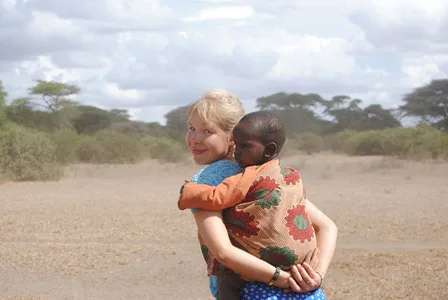Final Impressions of SFS Kenya & Tanzania
What did you like most about the SFS experience?
I like the way learning happens here. We had a lot of time in the classroom at first, then we brought that new knowledge out into the field and practiced with it, whether it was assessing vegetation levels, counting large mammals or interviewing locals about human and wildlife conflict. And now, we’ve been able to really apply what we’ve learned in our Direct Research. I love that I’m taking my knowledge outside the lecture hall and into the real world, where it’s useful and important. Tomorrow we’re doing our presentations of our research to the community. So I guess what I like the most about SFS is that the knowledge I’ve learned here matters and has a potential to make a difference in this community.
You’ve been in East Africa for a full semester – tell us your impressions of it now.
I truly love Tanzania. I enjoyed my time in Kenya as well, but at Moyo Hill we are interacting with local people a lot more frequently. As an anthropology major, and as a chatterbox, I enjoy this immensely. People here are patient and kind. I’ve learned the importance, as I mentioned before, of slowing down. I was advised in Kenya to always do three things. To eat with people. To drink tea with people. And to ask people what their favorite things are. And living here has shown me the importance of this. It’s how you relate to others, and how you connect with them. We can lose sight of that so easily in America, where we often have texting and Facebook in place of patient conversations.
What is life at The SFS Center for Wildlife Management Studies really like? What are the best and the most challenging parts of living at a remote field station?
As I mentioned, the field station in Kenya was much more isolated than in Tanzania. Here I love to walk into town and bargain for mangoes, or have clothes made at the tailor’s. I like sitting with the neighbors on front porches and visiting new babies. I love going to church with new friends and listening to the beautiful Swahili hymns. So perhaps in terms of reliable internet and modern conveniences, we are a bit isolated. But otherwise, the lack of technology can be nice. It forces you to stop and read a book instead of surfing the web, to go play soccer with the staff or try your hand at a new recipe. You are more present when trying to evade boredom, and much more creative.
What ended up being your biggest challenge this semester both academically and culturally?
I think, especially in terms of our directed research interviewing local people, the biggest challenge has been to get passed being a “mzungu.” A lot of locals here aren’t used to white foreigners wanting to sit and talk, to know about their lives. They are used to tourists who want to see, buy and consume. I believe “wazungu” and “wanafunzi” (students) are fundamentally different. Because, as students, we come here to learn and understand and if we are lucky to share in the culture of this place. Bridging that gap has been a challenge.
What is the best memory you have from the semester? Give some highlights.
Mmm… that’s tough?! Only one? I loved speaking with people during DR. I think my favorite memory would be when my Swahili teacher and I convinced a boma of several hundred Maasai people I could speak KiMaasai. I faced the crowd and Yohana whispered Maa to me, and I repeated whatever he said. The women were thrilled! I’m still not sure what I said, but it must have been good. Apparently one woman asked how long I had been studying KiMaasai, and Yohana had me reply “two weeks!” I still really only know how to say “hello,” “goodbye”, and “thank you,” but I’m working on my Swahili, and maybe can fit a little real Maa in too.
Give three adjectives that best describes how you are feeling right now.
Accepted. Ever-curious. Ready.

Related Posts

Camila Rojas: Alumni Spotlight⭐

